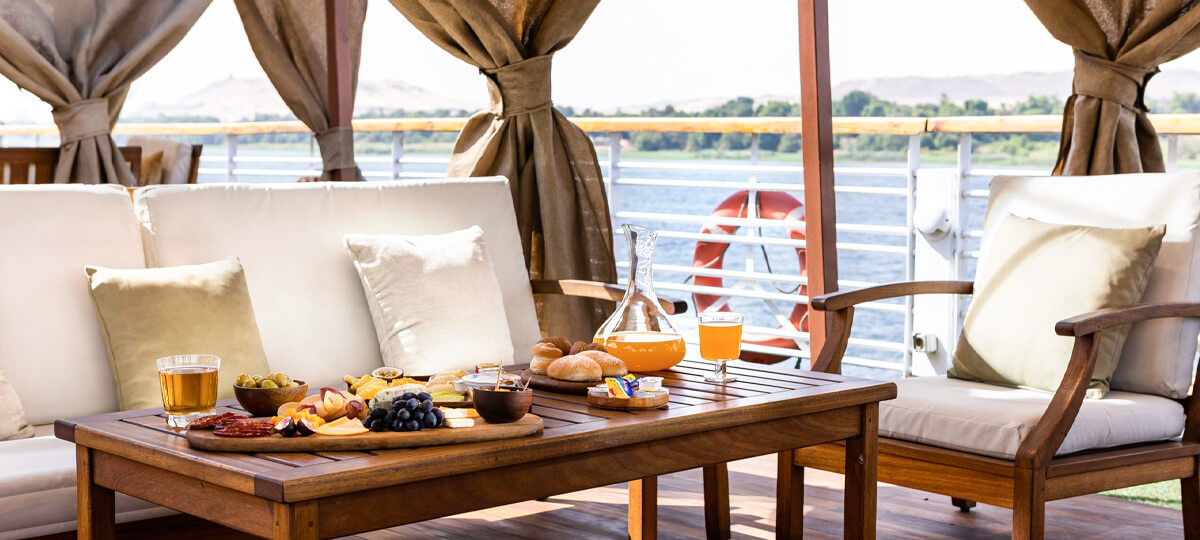Nile Cruise Food: A Delicious Dining Experience on The Nile
Welcome aboard, travelers! Today, we embark on a delightful journey down the mesmerizing Nile River in Egypt, renowned for its iconic cruises that have captured the hearts of countless adventurers. Among the various reasons that draw travelers to this magnificent destination, the compelling experiences of Nile cruise food stand out.
So, indulge your taste buds as we take you on a delectable culinary adventure amidst stunning landscapes and rich history. From traditional Egyptian dishes bursting with flavors to international delights, this blog post will be your ultimate guide to savoring the mouthwatering cuisines that await you on this enchanting Nile cruise.
Explore our Best Egypt Nile Cruise Trips:
- Al Hambra Nile Cruise
- Blue Shadow Nile Cruise
- Alyssa Nile Cruise
- Crown Jewel Nile Cruise
- Paradise Nile Cruise
- MS Le Fayan Nile Cruise
Nile Cruise Food & Egyptian Cuisine

- Egyptian cuisine is rich in culture and flavor. This ancient land has long been a melting pot of diverse civilizations, and its culinary traditions have evolved over centuries, blending regional and historical influences. Egyptian cooking uses fresh, locally-sourced ingredients to make delicious, healthy meals.
- Egyptian food is only defined by its most popular dishes. First, “koshari,” a delicious comfort food with lentils, rice, chickpeas, pasta, and a generous drizzle of spiced tomato sauce. Locals and visitors love this hearty dish’s unique flavors and textures. “Ful medames”—slow-cooked fava beans with garlic, lemon juice, and olive oil—is another must-try.
- Try “molokhia” to expand your palate. This spinach-like green leafy vegetable makes a tasty stew that can be eaten with rice or bread. Egypt’s culinary delights are endless.
- Egyptian cuisine connects past and present through its flavors. Pharaohs, Arab, Turkish, and Mediterranean influences have shaped Egyptian cuisine today. Each region’s cuisine enhances Egypt’s gastronomic diversity.
- Egyptian food conveys identity, hospitality, and togetherness. Egyptian life revolves around spice markets, family meals, and preserving old recipes.
Don’t miss Reading A Quick Review of Nile Cruises in Egypt
The Culinary Highlights of a Nile Cruise
- One of its biggest draws is trying authentic Egyptian food on a Nile cruise. The river’s culinary experiences are unforgettable. Nile Cruises prides itself on creating a dining experience that showcases traditional Egyptian cuisine and accommodates guests’ diverse palates.
- A Nile cruise ship’s dining options rival the best restaurants. You’ll experience a delicious culinary journey from the moment you sit down. Skilled chefs on cruise ships prepare authentic Egyptian dishes, ensuring every bite celebrates local flavors and culinary heritage.
- Nile Cruises’ cuisine is fantastic. Expect succulent grilled meats seasoned with aromatic herbs and spices and rich stews made with the freshest local ingredients. The Nile Valley’s fertile soil inspires the chefs’ ingredients.
- But a Nile cruise’s thoughtful blend of local and international cuisine makes it truly outstanding. Cruise ships understand the importance of catering to different tastes and preferences while presenting authentic Egyptian flavors. Thus, there are many international options to satisfy everyone’s palate. The culinary team onboard can satisfy your cravings for Mediterranean, Asian, or Western cuisine.
- The Nile River makes breakfast, lunch, and dinner memorable. Enjoying delicious food while watching the changing scenery outside is magical. Your dining experience enhances the historical and natural sights you see.
- Nile Cruises accommodates special diets. Vegetarian, vegan, gluten-free, and other diets are accommodated so no one misses the delicious food. Making guests feel comfortable and satisfied enhances the cruise experience.
Check Here For More Information about the Best Time for Nile Cruise
A Day of Dining on a Nile Cruise
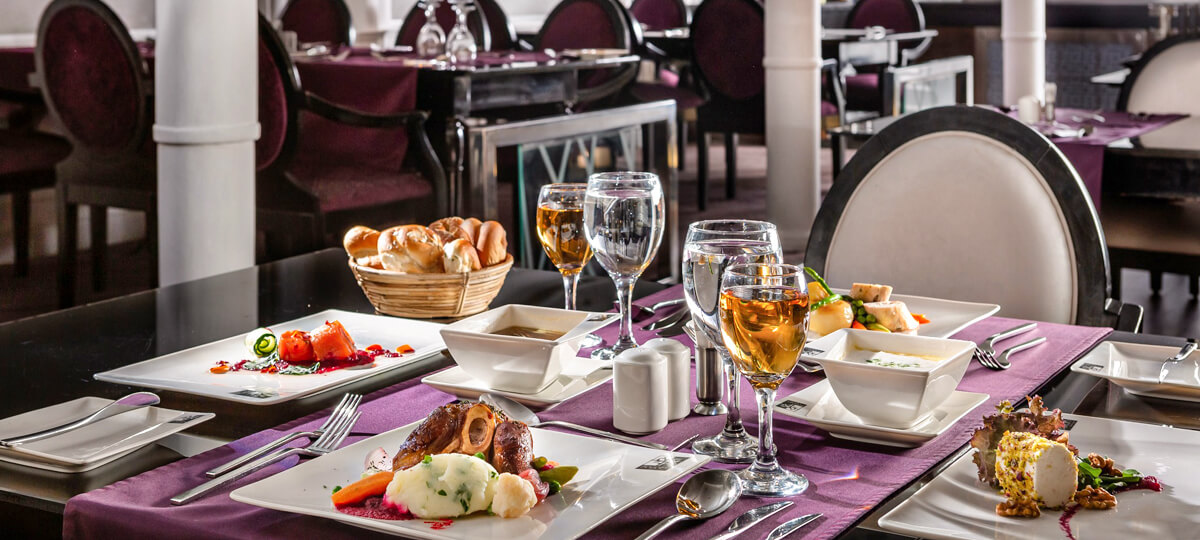
Breakfast: As the sun gently rises over the Nile River, waking up to a delightful Egyptian breakfast is an experience that will leave you eager to embrace the day’s adventures. Egyptian breakfasts are a feast of flavors, offering a perfect blend of traditional and international delights.
Among the local favorites, you’ll find “falafel” – crisp and savory chickpea fritters, and “taameya” – delectable Egyptian falafel made with fava beans and aromatic spices. These are often served alongside freshly baked bread, creamy hummus, and cheeses.
For those with a sweet tooth, an assortment of fresh fruits, honey-drenched pastries, and creamy yogurt will satisfy your cravings. To cater to the diverse preferences of international travelers, Nile Cruises also offer continental breakfast options. Indulge in fluffy omelets, buttery croissants, and various cereals and muesli. No matter your taste, a nourishing breakfast awaits to fuel you for the day ahead.
Lunch: As you sail along the timeless Nile, prepare for a sumptuous buffet-style lunch. The lunch spread onboard is a true celebration of Egyptian cuisine, featuring various dishes that will leave you spoilt for choice. Vegetarian and non-vegetarian options are aplenty, ensuring everyone finds something they love.
Savor aromatic rice dishes, hearty stews, and grilled vegetables, all infused with the authentic spices that make Egyptian cuisine so enticing.
As you sit down for lunch, the ever-changing scenery outside will also be a feast for your eyes. Dining against the stunning backdrop of the Nile is an experience, making your meal even more memorable.
Afternoon Tea: In the afternoon, indulge in the delightful tradition of afternoon tea, a charming interlude that allows you to relax and savor the passing beauty of the river. Nile cruises pay homage to this age-old tradition with a selection of teas, from traditional black teas to aromatic herbal blends.
If you prefer, there’s also freshly brewed coffee to enjoy. Accompanying your drinks are delightful Egyptian pastries, often filled with dates, nuts, or sweetened cheese. This tranquil afternoon break is perfect for reflecting on your journey and anticipating the evening’s culinary delights.
Dinner: Prepare for an elegant, sophisticated dinner setting on the cruise ship as night falls. The dinner experience is a highlight of the day, where you’ll have the chance to taste some of Egypt’s specialty dishes. For the adventurous foodies, “stuffed pigeon” is a must-try delicacy – a flavorful dish with rice, herbs, and spices served inside a tender roasted pigeon.
If you prefer grilled delights, succulent “kebabs” are often on the menu, featuring tender cuts of meat or flavorful marinated vegetables.
Check out this article for more information on How to book a Nile Cruise?
Culinary Classes and Demonstrations
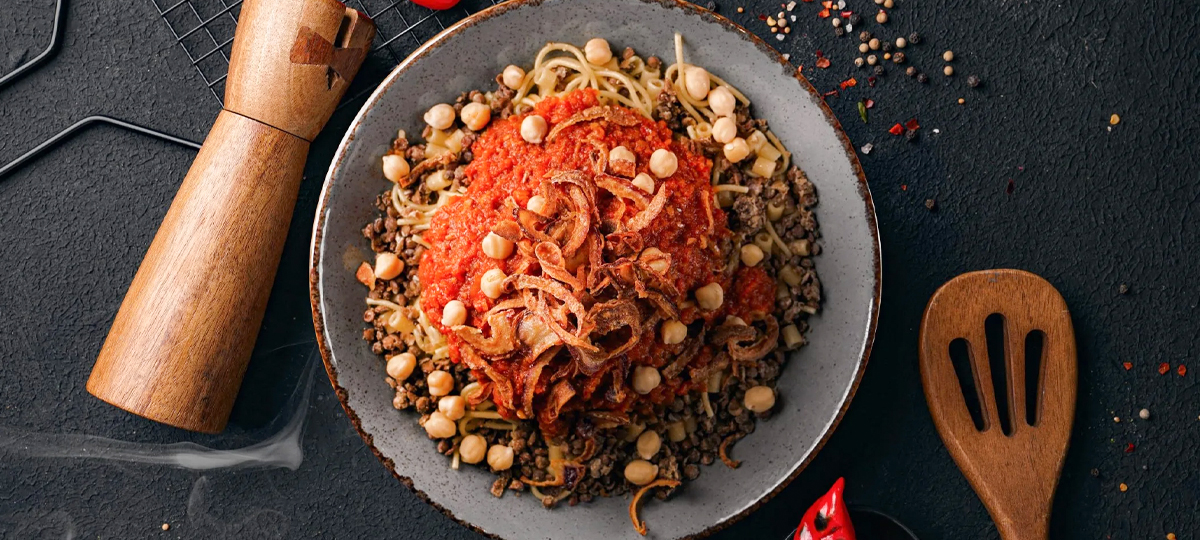
- A Nile cruise offers cooking classes and demonstrations for foodies who want to explore Egypt’s cuisine. These tours allow passengers to roll their sleeves and learn how to make authentic Egyptian cuisine.
- In these interactive culinary sessions, onboard chefs showcase their expertise and local cuisine knowledge. They love Egyptian food and want to teach others about it. Their enthusiasm makes classes fun and educational.
- These hands-on classes teach travelers how to make traditional Egyptian dishes. These experiences reveal Egyptian cooking’s complexities, whether making perfect falafel or aromatic spice blends. The chefs’ advice boosts participants’ cooking confidence.
- All skill levels can take these culinary classes. The chefs customize their instructions so everyone can participate and make a delicious dish. It’s a great way to bond over food and make memories.
- The culinary journey continues with fascinating chef demonstrations. You’ll see Egyptian cooking’s magic as the chefs prepare various dishes. Every rally is a sensory experience, from ingredient preparation to dish presentation.
- These interactive culinary experiences teach passengers about Egypt’s cuisine, customs, and traditions. Egyptian cuisine’s rich history and diverse communities are on display.
- Passengers bond over these cooking classes and demonstrations. Strangers bond over food and adventure as they try new things.
Check out this article for more information on What to Pack for a Nile Cruise?
Special Dietary Requirements
- How will a Nile cruise accommodate your dietary restrictions? Rest assured, Nile cruise ships are prepared to meet the diverse needs of their passengers, ensuring a delicious and satisfying dining experience.
- Onboard, you’ll find delicious vegetarian, vegan, and gluten-free options. Chefs carefully prepare dishes that meet dietary restrictions and taste like Egyptian food. The region’s fresh vegetables, grains, legumes, and fruits allow for various nutritious and delicious plant-based dishes.
- Vegetarians can enjoy hearty stews, salads, and rice dishes highlighting plant ingredients. Vegans can enjoy falafel, hummus, pasta, and fruit platters.
- Egyptian cuisine is gluten-free. Nile cruises offer wheat, barley, and rye-free meals. On the cruise, enjoy gluten-free bread, pasta, and rice-based desserts.
- Informing the cruise company of your dietary needs ensures a smooth dining experience. This helps the culinary team plan and prepare a delicious menu that meets your nutritional needs.
- The onboard staff is happy to help with mealtime requests. The team strives to make your meal memorable.
- Egyptian hospitality emphasizes accommodating special diets. By meeting passengers’ needs, cruise lines create a welcoming environment.
Dining with a View: Nile-side Restaurants
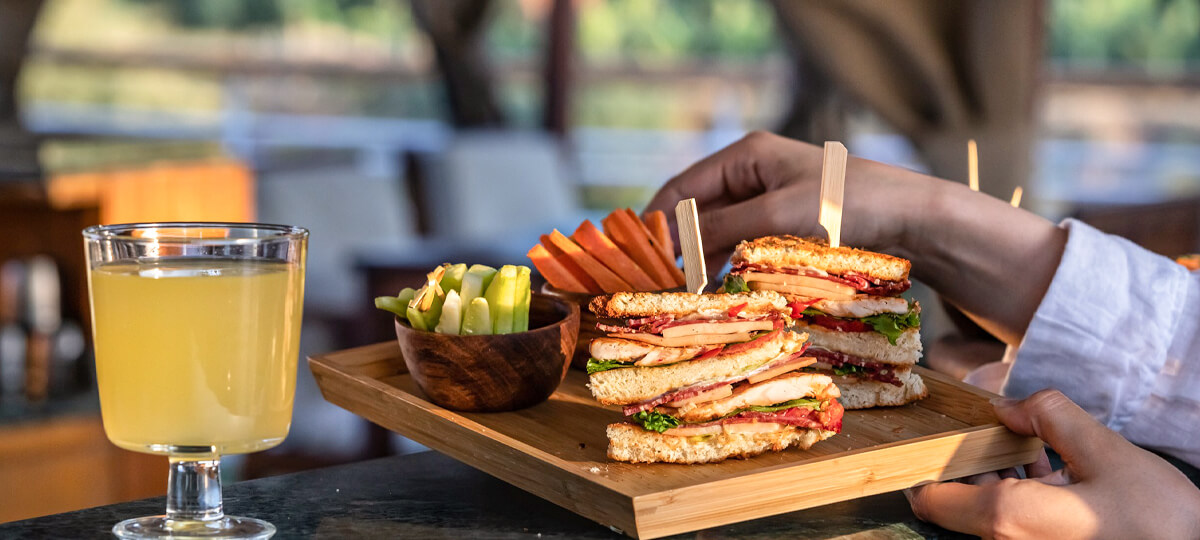
If you’re looking for a dining experience that combines mouthwatering local delicacies with breathtaking views of the Nile, the cities of Luxor and Aswan have some delightful surprises in store for you. These Nile-side restaurants offer delectable flavors and a chance to immerse yourself in the beauty and charm of Egypt’s iconic river.
Luxor Top Restaurants:
Nile Valley Restaurant: Nestled along the banks of the Nile, Nile Valley Restaurant boasts a serene ambiance and panoramic views that complement its exceptional culinary offerings. Here, you can savor an array of traditional Egyptian dishes crafted with the freshest ingredients from the Nile Valley. Don’t miss their signature dish, “Kushari,” a delightful mix of lentils, rice, pasta, and crispy fried onions, topped with flavorful tomato sauce. For a truly indulgent experience, try the succulent “Kebabs,” tender grilled meats seasoned to perfection.
Sofra Restaurant: Sofra Restaurant offers an enchanting setting with its open-air terrace overlooking the Nile. The restaurant is renowned for its warm hospitality and using locally-sourced ingredients. A must-try here is “Molokhia,” a hearty green leafy stew often served with rice, reflecting Egyptian comfort food’s essence. For dessert, indulge in the sweet delight of “Umm Ali,” a delectable bread pudding with a combination of nuts, raisins, and creamy goodness.
Aswan Top Restaurants:
Kebabgy Aswan: Situated on the picturesque Elephantine Island, Kebabgy Aswan treats diners to a blend of mouthwatering cuisine and breathtaking Nile views. The restaurant is renowned for its delectable grilled meats, and vegetarians will also find delicious options like “Vegetarian Kebabs,” featuring marinated vegetables. For an authentic taste of Aswan, try the traditional “Ful Medames,” slow-cooked fava beans, and the refreshing “Hibiscus Juice,” a local favorite.
1886 Restaurant: Named after the year the iconic Old Cataract Hotel was established, 1886 Restaurant offers an elegant and refined dining experience by the Nile. The menu features a fusion of Egyptian and Mediterranean flavors. Indulge in the exquisite “Stuffed Pigeon,” a specialty dish of the region, and be sure to sample the “Tahini Salad” with its delightful sesame dressing. Finish your meal with “Basbousa,” a lovely semolina cake soaked in sweet syrup.
These Nile-side restaurants tantalize your taste buds and let you enjoy the tranquility of the Nile River, creating unforgettable memories. Each restaurant offers a unique experience that complements your Nile cruise, whether you want traditional Egyptian or international cuisine with breathtaking views. Enjoy your meal and the Nile views!
Dining Etiquette in Egypt

When traveling to Egypt, experiencing the local cuisine is essential to immersing oneself in the culture. However, it’s important to be aware of the dining etiquette in Egypt to ensure a respectful and pleasant dining experience. Here are some essential tips to help travelers navigate the cultural norms of dining in Egypt.
- Washing Hands: Before and After Meals A common practice in Egypt is to wash hands before and after meals. This is considered a hygienic gesture and a sign of respect for the food served and fellow diners. You may find a small basin and pitcher for this purpose in restaurants and homes, and it’s polite to participate in this ritual.
- Using the Right Hand for Eating In Egypt: as in many Middle Eastern cultures, the left hand is traditionally considered unclean, as it is used for personal hygiene. Therefore, it’s customary to use the right hand for eating. Whether dining with your hands or using utensils, try to use your right hand to show respect for the local customs.
- Communal Dining and Sharing Egyptian meals are often communal: with various dishes placed in the center of the table for everyone to share. When dining in this setting, waiting for the host or the eldest person to start eating before you begin is customary. Also, try to pace yourself and avoid finishing all the food on your plate immediately, as it may signal that you want more.
- Refusing Food and Drinks: Politely Egyptians are known for their warm hospitality and generosity, and it’s common for hosts to offer more food and drinks throughout the meal. If you’re full or want less, declining politely but firmly is polite. You can do this by touching your heart and saying “shukran” (thank you) with a smile.
- Polite Table Manners General table manners are appreciated in Egypt: as they are in most places. Chew with your mouth closed, avoid talking with your mouth full, and try not to make loud noises while eating. Also, finishing everything on your plate is customary, as leaving food might be considered wasteful.
- Tipping Etiquette Tipping is common in Egypt: especially in restaurants and cafes where a service charge might not be included. A 10-15% tip is generally considered appropriate, but feel free to adjust based on the level of service provided. Leaving a small tip for the waiter or waitress shows appreciation for their efforts.
- Complimenting the Chef If you enjoy the meal: don’t hesitate to applaud the Chef or the host. Expressing your appreciation for the delicious food is a kind gesture and will be warmly received.
- Respect Local Customs and Traditions Overall: the key to dining etiquette in Egypt is to respect local customs and traditions. Egyptians are friendly and welcoming people, and showing an understanding of their culture through your actions will create a positive and memorable dining experience.
Street Food Adventures
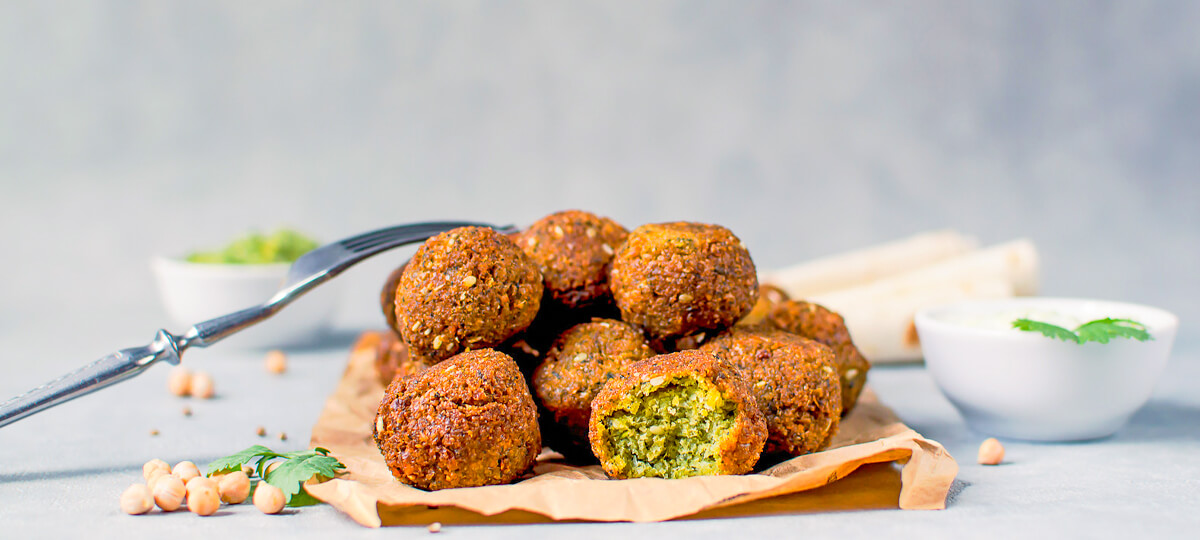
Foodies must explore Egypt’s bustling streets, especially Cairo. Egyptian street food is fascinating. Explore Egyptian street food to tantalize your taste buds and experience local life!
- The Irresistible Chickpea Delight Falafel is undoubtedly one of Egypt’s most beloved street food treasures. These delectable deep-fried balls, made from ground chickpeas or fava beans mixed with fresh herbs and spices, offer flavor in every bite. F falafel is often served on pita bread with tahini sauce, tomatoes, and cucumbers, which makes for a satisfying and convenient on-the-go snack.
- Koshari – A Fusion of Flavors Koshari is a unique Egyptian dish that embodies the country’s rich cultural heritage. This vegetarian delight is a symphony of flavors and textures, a delightful blend of rice, lentils, macaroni, and chickpeas, topped with a tangy tomato sauce and crispy fried onions. It is readily available from street food vendors who take pride in serving this beloved national dish.
- Taameya – Egypt’s Version of Falafel Similar to falafel, taameya is a variation of this beloved Middle Eastern snack but with its distinct twist. Made from crushed fava beans and blended with herbs and spices, taameya boasts a unique taste that sets it apart from traditional falafel. Often enjoyed with pita bread, vegetables, and tahini sauce, this savory treat is a popular choice among locals and tourists alike.
While exploring the street food scene in Egypt can be a delight, it’s crucial to prioritize hygiene and safety to ensure a pleasant culinary experience. Here are some tips to help you savor street food without compromising your well-being:
- Choose Popular and Busy Stalls: Opt for street food vendors with long queues and bustling crowds. High demand usually indicates fresh and well-prepared dishes, reducing the chances of food sitting out for extended periods.
- Observe Food Handling Practices: Take a moment to observe how the food is handled and prepared. Vendors who maintain clean and organized workstations are likely to prioritize hygiene.
- Ensure Proper Cooking: For meat-based street food items, ensure the meat is thoroughly cooked to avoid potential health risks. If you have concerns, consider vegetarian options that eliminate this issue.
- Stay Hydrated: The Egyptian sun can be intense, especially during peak hours. Stay hydrated by drinking bottled water and avoid consuming food that appears excessively oily or greasy.
- Trust Your Instincts: If something doesn’t look or smell right, it’s best to trust your instincts and seek an alternative option.
After learning about popular Egyptian street food and how to stay safe, it’s time to embrace the vibrant street food culture. Let Egypt’s aromatic alleys and bustling markets lead you to unforgettable experiences. Savor Egypt’s street food, local customs, and flavors!
Bringing Home the Flavors of Egypt

Bring back Egypt’s flavors as souvenirs to relive your trip and share its magic with friends and family. Egypt has a wealth of exotic spices and ingredients to spice up your home cooking. You can take some authentic Egyptian spices and ingredients home as souvenirs:
Egyptian Spices
- Dukkah: This blend of toasted nuts, seeds, and spices is a quintessential Egyptian condiment. Its earthy and nutty flavors make it versatile in salads, bread dipping, and meat seasoning.
- Sumac: With its tangy and lemony taste, sumac is a popular spice used in Egyptian dishes to add a delightful zing. It pairs perfectly with grilled meats, salads, and rice dishes.
- Cumin: Widely used in Egyptian cuisine, cumin imparts a warm and slightly nutty flavor to dishes. It’s an essential spice for authentic falafel and many other Egyptian recipes.
Unique Ingredients
- Dried Hibiscus Flowers: Known as “karkadeh,” dried hibiscus flowers make a refreshing and vibrant red drink. It’s a popular beverage in Egypt, especially during hot weather.
- Molokhia Leaves: Molokhia is a leafy green vegetable that features prominently in Egyptian dishes, particularly in the traditional “Molokhia Soup.” Bringing dried molokhia leaves allows you to recreate this iconic dish at home.
Egyptian Sweets and Pastries

- Baklava: This delicious pastry made of layers of phyllo dough, nuts, and honey is a beloved treat in Egypt. Many local bakeries sell baklava in beautiful gift boxes, making it a perfect gift to take home.
- Basbousa: Also known as “Hareeseh,” this semolina cake soaked in simple syrup is a delightful sweet indulgence that captures the essence of Egyptian desserts.
When it comes to purchasing these culinary delights, there are several reputable stores and markets in Egypt where you can find authentic products:
- Khan El Khalili Market (Cairo): This bustling bazaar in the heart of Cairo is a treasure trove for spices, dried herbs, and traditional Egyptian ingredients. You’ll find an array of colorful stalls offering various culinary delights.
- Spice Shops in Luxor: Luxor is renowned for its aromatic spice shops. Wandering through these stores, you’ll encounter an assortment of spices and herbs used in Egyptian cuisine, all of which make for excellent souvenirs.
- Bazaars in Alexandria: Alexandria’s vibrant bazaars are fantastic places to find authentic Egyptian sweets like baklava, basbousa, and other delectable treats packaged beautifully for travel.
- Supermarkets and Specialty Stores: In major cities like Cairo, Alexandria, and Luxor, you’ll find modern supermarkets and specialty stores that offer packaged spices and ingredients, making it convenient to purchase and carry home.
Don’t miss to Check Out Our Egypt Nile Cruise Packages
Conclusion Nile Cruise Food
Finally, a Nile cruise offers a memorable culinary experience. Egypt’s varied and delicious cuisine will delight every traveler. From falafel to koshari, a delightful mix of lentils, rice, pasta, and rich tomato sauce, there are many delicious dishes to try. Egypt’s ancient wonders and delicious flavors are revealed on the Nile River.
As you sail the majestic river, embrace local customs and traditions and experience Egyptian culture through its delicious food. Enjoy baba ganoush, hummus, and freshly baked pita bread with the mezze. Basbousa, a syrup-soaked semolina cake, is delicious. Each dish reflects Egypt’s long history and the many civilizations that shaped its cuisine.
Egypt’s cuisine enhances the travel experience beyond its historical sites and awe-inspiring temples. Local food pleases the palate and introduces visitors to the locals’ daily lives.
You’ll find street food stalls and local restaurants in Cairo and Luxor’s busy streets and markets. Interact with the friendly locals, who love to talk about their food and traditions.

